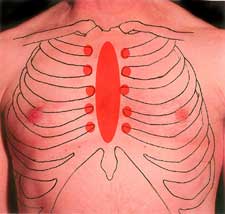
Your doctor will also ask you about your past medical history and check if you have any risk factors that can increase your chance of getting heart disease, such as smoking, diabetes, high blood pressure, high cholesterol, or if you are older than 50 years.

How are the causes of chest pain diagnosed? You may also have other symptoms along with chest pain, which will help your doctor work out what is causing your chest pain. It can also be a sharp pain, stabbing pain or a heavy chest pain. Depending on the cause of your chest pain, it can start suddenly or slowly, and may spread to other areas such as your back, jaw, neck or arms. What are the symptoms of chest pain?Ĭhest pain is a broad term for any pain, tightness or discomfort felt in your chest area. It may then be called ‘non-specific’ chest pain. Sometimes it is not possible to identify the cause for chest pain after a thorough medical assessment.
DEEP UPPER CHEST DISCOMFORT SKIN
shingles – a blistering skin rash with pain.costochondritis – inflammation of joints in your chest.chest wall injury such as muscle strain or a bruised or broken rib.gallstones or pancreatitis (inflammation of the pancreas).heartburn, indigestion or gastroesophageal reflux disease (GORD).ruptured oesophagus – this can happen after retching, vomiting or medical procedures.pneumothorax (collapsed lung) – air trapped in between your lung and chest wall.pulmonary embolus – a clot in one of the blood vessels in your lungs.aortic dissection – a tear in your main artery (the aorta).pericarditis – inflammation of the lining around your heart.angina – chest pain that occurs when the blood supply to the muscles of your heart is restricted.heart attack – blockage of one of the blood vessels supplying your heart.Some of the more serious causes of chest pain caused by problems of your heart and lungs include: However, even mild chest tightness or discomfort can be the first sign of something more serious such as a heart attack or a blood clot in your lung. Most of the time chest pain is not caused by heart problems, especially if you are younger than 40 and otherwise well.
DEEP UPPER CHEST DISCOMFORT PROFESSIONAL
You need to talk to a healthcare professional who can give you proper advice. Also, do not ask for advice from family or friends. Ring Healthline 0800 611 116 for advice now if you are unsure what to do.ĭo NOT diagnose yourself from this information or any information you find on the internet. you have chest pain that goes away quickly but you are still worried.you have chest pain that comes and goes.If you still have symptoms after 10 minutes, treat it as a heart attack. If you have angina medicine, stop, rest and take your angina medicine according to your action plan. Stop, rest and call 111 for an ambulance straight away as you need immediate treatment in hospital. is accompanied by nausea (feeling sick), sweating, dizziness or shortness of breath.feels like crushing pain, heaviness, tightness or pressure in your chest or.spreads to your arms, back, neck or jaw or.


 0 kommentar(er)
0 kommentar(er)
